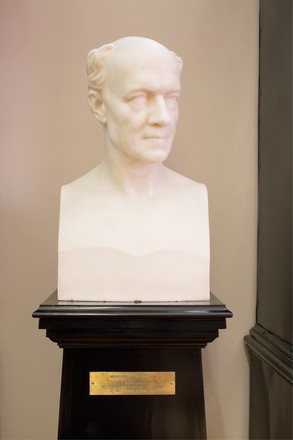Portrait bust of Sir Roger Therry
1870
marble on wooden stand
Donated by Mrs Sophia Therry, 1912
XR 31
Arriving in Australia from Britain in 1829, judge and politician Sir Roger Therry was an influential humanist who played an active role in promoting education at all levels. His likeable character, good connections and passion for equality were instrumental in shaping the academic framework of this country. Therry’s roles during his 30 years in Australia included serving as a founding senator of the University of Sydney as well as one of the first committee members of the NSW Public Library. Therry was also one of the colony’s most prominent Catholics, at a time when there was significant tension between the established Anglican church and Catholicism.
Therry’s association with the Library began in 1831 in the days of the Subscription Library, a private library reserved for the privileged few. As an active member and committee man, Therry was part of a group that sent a letter to the government requesting the construction of a ‘Public Library’ and supported abolishing member ballots as well as the expensive membership fees. This gave greater public access to a wealth of resources, and formed the foundation of the State Library as we know it today.
This marble bust of Sir Roger Therry was sculpted in Rome in 1870 by Charles Summers, four years before Therry’s death in 1874.
An unassuming talent
Classical sculptor Charles Summers was born in Somerset, England, in 1825. After studying art at the Royal Academy in London, he moved to Australia in 1854 because of ill-health. He initially headed for the gold fields, but returned to Melbourne and quickly earned himself a reputation as a fine carver and a leader of that city’s art community. He was commissioned to create commemorative works for notable individuals such as Charles Sturt, Burke and Wills, Sir Redmond Barry and J P Fawkner.
Summers moved back to Europe in 1867 but he maintained a good working relationship with Australia. Australian clients would visit his European studio to sit for commissioned works, and he would ship the artworks back to Australia.
Summers died in Paris in 1878. Friends in Australia paid tribute to his humility and integrity. His obituary in the Argus described him as 'Simple in manners, frank and gentle in speech, modest and unassuming by nature, and entirely free from that self-consciousness and self-assertion which make some artists so intolerable in private life … his opinions [were] always the fruit of independent thought and reflection’.*
Footnotes
*
Australian Dictionary of Biographyhttp://adb.anu.edu.au/biography/summers-charles-4668
Man of many talents
As well as having a distinguished career in the law and public service, Roger Therry was an accomplished author. In 1826 he wrote the biography of former British statesman and prime minister George Canning, and edited a book of Canning’s speeches. Returning to England in 1859 after his time in Australia, he published his Reminiscences of Thirty Years' Residence in New South Wales and Victoria. Reviews in Britain were so favourable that a second edition was printed, but not so in NSW: on hearing that his book had been so severely criticised, Therry arranged for the return of all unsold copies. 'The best evidence I could afford that I had no intention at least of awakening painful feelings', he remarked on 25 March 1865, 'is that I suppressed the book when I learned that I had done so. The cost was no serious inconvenience to me and annoyed me less than the lesson I have learned of the valuelessness of some friendships on which I had relied'.*
Footnotes
*Australian Dictionary of Biography http://adb.anu.edu.au/biography/therry-sir-roger-2723
The right of religion
Sir Roger Therry was a man of staunch Catholic faith. Arriving in NSW 1829 he was shocked at the position held by his church and fellow Catholics. According to the Catholic historian James Murtagh, 'Therry found the Catholics of the Colony in a sad plight … During the first thirty years, [they] formed a quarter of the population, but their religion was unrecognised and their spiritual needs unprovided for' *.
Therry’s faith greatly impacted his professional life, yet caused much controversy among his influential Church of England peers in Australia. Despite this, he successfully campaigned for Catholic practitioners’ right to practice their religion (a right which had previously been denied) in the colony.
Footnotes
*Australian Dictionary of Biography http://adb.anu.edu.au/biography/therry-sir-roger-2723



 Back to list
Back to list